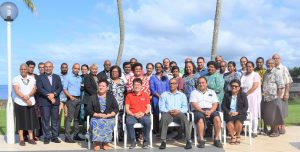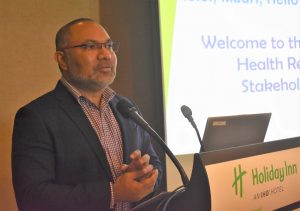

World Health Organisation Technical Officer, Dr Changgyo Yoon (Sitting, 2nd from left) and FNU’s College of Medicine, Nursing and Health Sciences (CMNHS) Dean Dr William May (sitting, middle) with the participants of the “Human Health Research Ethics Stakeholders Meeting”.
Fiji National University’s (FNU) College of Medicine, Nursing and Health Sciences (CMNHS) is collaborating with the industry stakeholders of its College Human Health Research Committee (CHHREC) to strengthen their research ethics structures and processes in order to better facilitate health research in the country.
According to CMNHS Associate Dean Research, Dr Donald Wilson, a lot of emphasis needs to be placed on ensuring that our students and staff who send research proposals through our CHHREC, are complying with international standards of research ethics that are enshrined in the FNU Research Policy and our CHHREC Standard Operating Procedure (SOP) while collecting data from health facilities, villages, settlements or other communities.
To promote a greater understanding of ethical issues while undertaking health-related research in the country, the College organised a three-day workshop in collaboration with the Ministry of Health and Medical Services (MoHMS), World Health Organization (WHO) and the Pacific Community (SPC), and was attended by close to 60 representatives from 10 different stakeholder organisations.
“We are collaborating with various organisations such as the I-Taukei Affairs Board for village protocols, local governments such as the Suva City Council for urban and peri-urban non-village settings, the Fiji Police Force for the process in obtaining sensitive crime data, we have Ministry of Health representatives from the divisional hospitals and several non-government organisations as well.”

Dr Donald Wilson.
Dr Wilson mentioned that there are cultural sensitivities in place and adhering to protocols while collecting data, not only allows researchers to better engage with the community, but also identifies risks while carrying out research.
While sharing similar ideologies, World Health Organisation (WHO) Technical Officer, Dr Changgyo Yoon stated that cohering to ethical principles is critical to protecting the dignity, rights and welfare of research participants.
“Health ethics is an interdisciplinary field encompassing a broad range of domains and issues, where we need not only health professionals’ perspective but also others perspective such as the education sector, religious leaders, community people,” said Dr Yoon.
“From a public health perspective, research ethics consider risks and benefits to society in addition to the individual research participants. Health research aimed at protecting the population as a whole needs to consider how the benefits and burdens of research can be shared fairly across society,” he added.
The participants of the “Human Health Research Ethics Stakeholders Meeting” will soon form a ‘Research Ethics Network’ to continue to ensure improvements in the research ethics processes and for capacity building in various research skills and competencies.